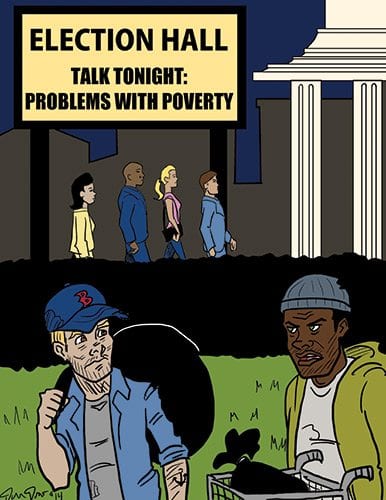
Many Americans once believed in the old adage “if you work hard and follow the rules you will succeed in life.” As the possibility for sustaining a middle class lifestyle declines, and poverty has become more common, attitudes toward the likelihood of success and poverty have changed.
American heroes are still the titans who are able to amass great fortunes. Conversely, there was once disdain for those who were unable to put a decent roof over their heads and food on the table. Now there is greater understanding of the difficulties people face. Results of a recent poll by the Center for American Progress conclude that, “rising inequality, unequal economic growth, insufficient access to education and jobs, and low wages are preventing the United States from having a vibrant economy in which all have a fair shot to get ahead.”
Even a substantial majority of white conservatives (63 percent) believe that “most people who live in poverty are poor because their jobs don’t pay enough, they lack good health care and education, and things cost too much for them to save and move ahead.” This result is less than what white liberals believe (74 percent) but surprisingly more than African Americans (60 percent).
Still, 25 percent of the respondents believe that “most people who live in poverty are poor because they make bad decisions or act irresponsibly in their own lives.” As might be expected, African Americans did not tend to accept that conclusion. Only 17 percent agreed. They are undoubtedly aware of the high incidence of misfortune that can beset the lives of blacks.
For many years the issue of poverty did not get the attention it deserves, probably because the excessive media focus on black poverty had successfully made the American public believe it was primarily a black problem. However, the salary stagnation of the middle class over the past 25 years has suppressed many Americans involuntarily into the lower class. This has raised questions of income disparity and a minimum wage that is not keeping pace with rising inflation.
When fighting against income disparity, a national poverty rate of 15.1 percent is no longer acceptable. And the picture behind that number is truly ugly. While whites have a poverty rate of 9.9 percent, African Americans have to endure a rate of 27.4 percent. Even with the lower poverty rate, the actual number of whites living in poverty is almost three times the number of poor blacks because of the much larger white population.
There is no sound political reason for poor whites to refuse to unite with blacks to improve the lot of them all. Unfortunately, the historical racial enmity still operates as a barrier. However, it is reasonable to expect the displaced middle class to move in the political direction that will fatten the purse despite racial issues.
Response to a question in the Center for American Progress poll suggests a general interest in political reform. Seventy percent of the respondents offered their favorable support to the question “would you support or oppose the president and Congress setting a national goal to cut poverty in half in the United States within 10 years?” Among African Americans there was an 87 percent response for support.
Now stories are emerging about poverty in Appalachia and other places with a negligible black population. Perhaps remedial efforts will gain more political support if they are not viewed primarily as special benefits for blacks.






